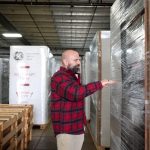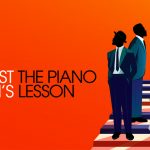2006-01 Vital Source Mag – January 2006
Madonna
By Jon M. Gilbertson When music industry observers can refer to an album that �only� went platinum as a serious failure, then it�s clear they�re talking about an artist who�s redefined the concept of success. In the last 25 years, that could only be Madonna, whose 2003 work, American Life, sold over a million copies without one Top Ten single. Hence Confessions on a Dance Floor, which revisits the clubs that first played her. Musically, it�s clearly a throwback; the tracks run together like the set of a particularly adroit DJ who knows her listeners don�t want to hear a single moment of silence to break their absorbed movement. Although �Future Lovers� touches upon the multiple harmonies of psychedelic-era Beatles, and �Hung Up� leads off the album as a genuine single, this is less a pop album to be heard than an extended mix of beats to feel as the lights flash and the drugs and alcohol do their things internally, and the sweat and sexual energy do their things externally. Lyrically, Confessions is mostly as empty as Madonna�s bank account is not, although that doesn�t prevent one or two musings, notably �Let It Will Be,� on the price of fame. Yet the combination of self-importance and everyday cliché�plus the use of the word �dork� as a rhyming lynchpin in the East Coast solipsism of �I Love New York��are in this context as beside the point as Esther, her Kabbalah name. The album is all about rhythm and motion, even if both point to the past rather than to the future, where Madonna supposedly was once leading the rest of us. VS
Jan 1st, 2006 by Vital ArchivesThe Reigning Sound
By It�s a cold November night when Greg Cartwright and his group The Reigning Sound take the Mad Planet stage. Cartwright clears his throat and apologizes for his hoarseness. But that�s not a problem, he sounds somewhere between Bobby �Blue� Bland and Paul Westerberg. In that perfect parallel universe, Cartwright�s songs are hits and writers don�t drop obscure references. A white artist hasn�t exhibited this much soul since Charlie Rich exited the planet, and as a young man Cartwright should have plenty of years ahead. With The Oblivions and later The Compulsive Gamblers, Cartwright helped pilot Memphis projects of chaos, blues, punk and Gospel. The Reigning Sound albums took a decided turn toward melody, featuring Alex Greene�s proto-soul keyboards and slowed tempos. While still wholeheartedly a mix of garage and R&B, lyrically Cartwright wears his heart on his sleeve and backs the whole thing up with hooks that refuse to leave your head. Outtakes, different arrangements, an odds & sods compilation: call Home For Orphans what you will, but this band�s crumbs are better than most groups� top-shelf material. �Funny Thing,� as close to a perfect song as you might hear, adds uncredited pedal steel to notch the melancholy factor. Much like Roy Orbison, �What Could I Do� frames what could be a short novel or black and white movie based around the interactions of three people, and leaves the listener intensely curious about the outcome. Chicago�s Green and vintage Brian Wilson come to mind throughout the album as The Reigning Sound work from solid, tried and true song structures, guitar or Hammond organ solos that build off the tune�s melody, and la-la-la vocal choruses. Nothing you haven�t heard before, but rare to hear it done so well in this day and age. And just when you fear it�s getting a bit introspective, the album�s finale is a live blast through �Don�t Send Me No Flowers I Ain�t Dead Yet.� Maxwell�s is a blurred snapshot. Recorded on a weeknight at the legendary New Jersey club, The Reigning Sound blast through a set that includes covers of Sam Cooke and Sam & Dave as well as a blitz through �Stormy Weather.� Not entirely breakneck, but when Cartwright asks the audience to bear with his guitar playing, �I�m down to three strings,� you know these guys will stop at nothing to get the music across. VS
Jan 1st, 2006 by Vital ArchivesJohn Cale
By Eric Lewin Postmodern music sure is ironic. �Progressive� bands such as Brian Jonestown Massacre, The Warlocks and the rest of the MySpace-endorsed shoegazers generally make their way by rethreading Velvet Underground�s effects and hypnotic hum, some pulling it off more ably than others. Even more ironic is that John Cale, Velvets� second-in-command behind Lou Reed, refuses to overtly borrow from his old band. Black Acetate has its influences, to be sure, but none of them hung out with Andy Warhol. Acetate plays like a Frank Zappa record in that it relies heavily on eerie effects, creepy voices and funked-out Mothers of Invention-style bass lines. A well-lit room is recommended during the spooky �Brotherman;� when Cale groans that he writes �reams of this shit every day� in a Leonard Cohen grunt, it�s downright terrifying. For better or worse, Acetate doesn�t dwell in the horrific for too long. Hell, it doesn�t dwell anywhere for too long. Cuts like �Gravel Drive� and �Satisfied� are undeniably beautiful, not to mention flavorful, when positioned next to rockers �Sold-Motel� and �Perfect,� which border on danceable. Trying to outrun a monster legacy like Velvet Underground at all costs is an impossible task that Cale doesn�t attempt. While Acetate contains minimal elements of White Light/White Heat, it comes filtered through Velvet-inspired records such as Love and Rockets� Earth Sun Moon. A musician being influenced by musicians that he himself influenced? All this post-modernity is confusing, but it sure is fun. VS
Jan 1st, 2006 by Vital ArchivesInner Space
By Eric Francis Aquarius (Jan. 20-Feb. 19) Is there a room in your house suitable as a movie theater? I think there is, even if it’s a modest digital theater. This is the year of the Aquarius Odeon, to which the whole neighborhood can be invited regularly. It’s the spirit that counts more than anything, and the quality of what you present – make it weird, intellectual, retro and neo all at once. Given that your whole life has taken on this cinematic quality, Hollywood is the perfect decorating theme. This will help keep the dramas where they belong, on the screen rather than acted out in real life – unless you’ve been planning to audition for something, which I do recommend. Pisces (Feb. 19-March 20) Weird has been your middle name for a couple of years now, and you love it. You have the license to invent whatever you want and call it beautiful; if Andy Warhol got away with it, so can you. The essence is experimentation, fast changes and keeping what works. Going international would spark your imagination, and for some reason, African comes to mind. Dark colors, reds and browns – or pure white, not the usual blues and purples you’ve always loved so much. Keep it deep, and remember that all wealth comes from the Earth. Aries (March 20-April 19) You’re not the type to collect stuff, or even be particularly interested in it; but suddenly the material world means a lot more to you: material as in the textures of fabrics and colors of cloth that come to life in your fingers. This developing inner sensitivity seems to have become a passion, as if you’re seeing dark reds and browns for the first time in your life. Or like you never noticed the luxury of mahogany. Or food that you cook at home all afternoon. Will you ever go back to glass and chrome? Or Chinese take away? Let’s not ask. Taurus (April 19-May 20) Most of your renovation and redecoration is going to be psychological, so we might ask what constitutes the design equivalent of therapy. The answer starts with art, which needs to reflect the inner landscapes that have become so familiar recently. Choose pieces that represent who you are becoming, and images that depict feelings or settings you would like to make real. You’ve worked out your stuff’ enough to be feeling an unusual degree of dedication, passion and spiritual fire rising up. Keep it in sight, and look at it often. Gemini (May 20-June 21) For Gemini, the emphasis this year is on water, and a little goes a long way. You don’t want too much; it’s possible to use water for inspiration, or to drown emotionally. Balance is key. An aquarium would make a great addition to your home (invest in the best lighting you can get, so the plants will thrive), which will remind you of what the world of feelings is really about. At the same time, […]
Jan 1st, 2006 by Vital Archives




















